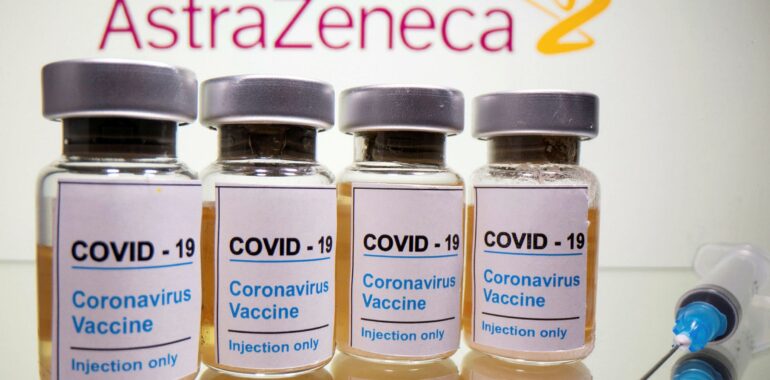Oxford University/AstraZeneca COVID-19 vaccine Safety data

Oxford University/AstraZeneca COVID-19 vaccine Safety data
Oxford University/AstraZeneca COVID-19 vaccine Safety data: On 30 December 2020, the Medicines and Healthcare products Regulatory Agency (MHRA) approved the COVID-19 vaccine developed by Oxford University/AstraZeneca for emergency supply in the United Kingdom.
AstraZeneca COVID-19 Vaccine is a monovalent vaccine composed of a single recombinant, replication-deficient chimpanzee adenovirus (ChAdOx1) vector encoding the S glycoprotein of SARS-CoV-2.
After administration, SRAS-CoV-2 glycoprotein S is expressed by locally stimulating neutralizing antibodies and cell immune responses.
AstraZeneca Vaccine is indicated for active immunisation of individuals 18 years or older for the prevention of coronavirus disease 2019 (COVID-19).
The AstraZeneca Vaccine consists of two separate doses of 0.5 ml each. The second dose should be given within 4 to 12 weeks of the first dose.
Oxford University/AstraZeneca Vaccine is for intramuscular (IM) injection only, preferably in the deltoid muscle.
The transport and storage requirements for this vaccine mean that it must be stored at temperatures between 2 C and 8 C.
MHRA confirmed that AstraZeneca COVID-19 Vaccine does not contain any components of animal origin.
Table of Contents
Oxford University/AstraZeneca COVID-19 vaccine Clinical data
AstraZeneca evaluated efficacy data based on an interim analysis of pooled data from four on-going randomized, blinded, controlled trials.
| Study Name | Country | Study description | Study Start date | Status |
| COV001 | UK | A Phase I/II Study to Determine Efficacy, Safety and Immunogenicity of the Candidate Coronavirus Disease (COVID-19) Vaccine ChAdOx1 nCoV-19 in UK Healthy Adult Volunteers | 23 April 2020 | Ongoing |
| COV002 | UK | A Phase II/III Study, COV002, in adults ≥18 years of age (including the elderly) in the UK | 28 May 2020 | Ongoing |
| COV003 | Brazil | A Phase III Study, COV003, in adults ≥18 years of age (including the elderly) in Brazil | 23 June 2020 | Ongoing |
| COV005 | South Africa | A Phase I/II study, COV005, in adults aged 18 to 65 years of age in South Africa | 28 June 2020 | Ongoing |
The primary efficacy endpoint based on a pooled analysis showed that the vaccine was 70.4% effective at preventing symptomatic COVID-19 occurring more than 14 days after receiving two doses of the vaccine.
A secondary efficacy endpoint of prevention of severe disease demonstrated no cases of severe infections or hospitalisations in the vaccine group.
Oxford University/AstraZeneca COVID-19 vaccine Safety data
Summary of AstraZeneca COVID-19 Vaccine Safety Profile
The overall safety of AstraZeneca Vaccine is based on an interim analysis of pooled data from four clinical studies conducted in the United Kingdom, Brazil, and South Africa.
At the time of analysis, 23,745 participants 18 years or older had been randomised and received either COVID-19 Vaccine AstraZeneca or placebo.
Of this number, 12,021 were vaccinated with at least one dose of the AstraZeneca COVID-19 vaccine.
The median duration of follow-up for the AstraZeneca COVID-19 vaccine was 105 days after dosage 1 and 62 days after dosage 2.
The possible Adverse drug reactions are as follows by category
Unsolicited uncommon Adverse drug reactions are
- Lymphadenopathy
- Decreased appetite
- Dizziness
- Abdominal pain
- Hyperhidrosis
- Pruritus
- Rash
- Injection site bruising includes injection site haematoma
Unsolicited common Adverse drug reactions are
- Influenza-like illness
Very common Adverse drug reactions are
- Headache
- Nausea
- Myalgia
- Arthralgia
- Injection site tenderness
- Injection site pain
- Injection site warmth
- Injection site erythema
- Injection site pruritus
- Injection site swelling
- Fatigue
- Malaise
- Pyrexia
- Chills
Common Adverse drug reactions are
- Vomiting
- Injection site induration
Notes:
- Very Common Adverse drug reactions means may affect more than 1 in 10 people
- Common Adverse drug reactions means may affect up to 1 in 10 people
- Uncommon Adverse drug reactions may affect up to 1 in 100 people
In clinical studies, there were very rare reports of events associated with inflammation of the nervous system, which may cause numbness, pins, and needles, and/or loss of feeling. However, it is not confirmed whether these events were due to the vaccine.
Reporting suspected adverse reactions If you are concerned about an adverse event, it must be reported to a Yellow Card.
Reporting forms and information can be found at https://coronavirus-yellowcard.mhra.gov.uk/ or search for MHRA Yellow Card in the Google Play or Apple App Store and include the vaccine brand and batch/Lot number if available.
To compare vaccines Oxford University/AstraZeneca COVID-19 vaccine Safety data with other vaccines, click here
Moderna COVID-19 Vaccine Safety data
Pfizer-BioNTech COVID-19 Vaccine Safety Data
One thought on “Oxford University/AstraZeneca COVID-19 vaccine Safety data”